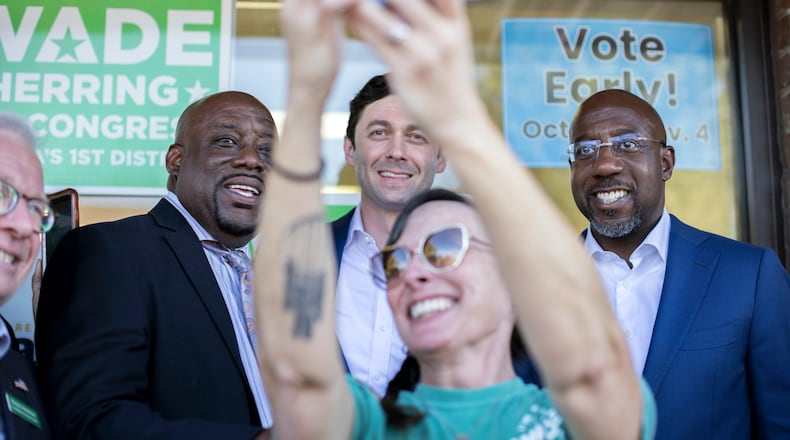SAVANNAH — Asked three days ahead of the vote for Savannah mayor how he was feeling about Tuesday’s election, the typically verbose Van Johnson responded with one word: “Tired.”
Fatigue is a given in a race that ends Tuesday but stretches back four years. The feud between Johnson, the incumbent, and challenger Kesha Gibson-Carter, an alderwoman, started with the first Savannah City Council meeting of the current term, in January 2020.
A difference in opinion over council officers — largely ceremonial titles — in their governing debut together and a push to loosen council rules regarding meeting agendas cleaved the legislative panel into two factions ahead of the next meeting. Acrimony between Johnson and Gibson-Carter has marked nearly every session since, turning the bimonthly meetings into what Johnson calls “the Thursday afternoon reality show.”
Gibson-Carter’s frustration with Johnson and his council allies led to her announcing her run for mayor in January 2022, or 23 months out from the election. By contrast, Stacey Abrams launched her 2022 Georgia gubernatorial challenge to Gov. Brian Kemp 11 months ahead of Election Day.
Credit: Kyunnie Shuman
Credit: Kyunnie Shuman
The candidates have ratcheted up the rhetoric on the campaign trail, where Johnson owns a $400,000 fundraising advantage over Gibson-Carter.
Gibson-Carter and her allies have swamped social media with criticism of Johnson, including numerous instances of misinformation and disinformation, and protested outside the mayor’s campaign rallies — a rarity in Savannah municipal elections.
Johnson adopted “dignity over drama” as a campaign slogan and levels pointed critiques at Gibson-Carter’s leadership style during speeches. Johnson’s campaign also reposted a mocking social media video made by one of the incumbent’s supporters.
The ugly campaigning has “turned people off,” said Chassidy Malloy, a Savannah voter and president of the local voting advocacy organization the League of Women Voters of Coastal Georgia.
“When you spend your time with mud-slinging you miss the opportunity to make your position known and make your agenda known,” Malloy said. “I wish they had stuck to the things that matter, and in Savannah right now, there’s a lot.”
Credit: Adam Van Brimmer/AJC
Credit: Adam Van Brimmer/AJC
Beneath the politicking, Johnson and Gibson-Carter have staked out their policy talking points. The stances mirror what’s played out at council meetings over the past four years: Johnson, who holds the council majority, touts his legislative successes on issues such as higher wages for city employees, including police officers and firefighters, affordable housing and government transparency. Gibson-Carter counters by embracing the anti-establishment positions and insisting Johnson hasn’t done enough.
Her theme is safety, both physical and economic. Violent crime is down significantly in Savannah since a change in leadership at the Savannah Police Department in July 2022 and the city has seen record tax collections since the end of the COVID-19 pandemic, but the Police Department remains understaffed and housing and other costs for Savannah residents have climbed since Johnson took office.
For example, housing rents rose 50% between 2019 and June 2023, according to the apartment listing service Rent Cafe, far outpacing the city’s 31% wage growth during that same period.
In three candidate forums staged over the past month, Gibson-Carter has stuck to her “Do you feel safer?” message. She has run a grassroots campaign, canvassing door to door, making the rounds of neighborhood association meetings and hosting weekend rallies in public parks.
“I am Savannah’s alternative to what we have seen in our community by way of rising crime, increasing poverty and forced displacement,” Gibson-Carter said during an Oct. 2 candidate forum.
Gibson-Carter employed a similar campaign strategy in 2019, when she upset a better-funded incumbent, Carol Bell, to win her council seat. According to Savannah State University’s Marion Bell, a political science and public affairs professor, grassroots campaigns by challengers have seen increasing success over the past decade at the local, state and federal levels but that incumbents still enjoy a number of advantages.
“They tend to be vulnerable if there has been a scandal or significant shift in the voting population,” Bell said. “Mayor Van Johnson’s time in office has not been characterized by scandal, and he has led Savannah during challenging times.”
Johnson, meanwhile, has campaigned more like the incumbent and poll front-runner that he is. His face stares down from billboards across the city, and he’s a constant at big-ticket events, such as the Metropolitan Savannah Hispanic Chamber of Commerce’s annual gala held Saturday. He worked the Hyatt Regency Savannah ballroom for an hour beforehand, shaking more hands than other high-profile politicos in the room, such as Georgia Secretary of State Brad Raffensperger and 2024 presidential candidate Robert Kennedy Jr.
His campaign rallies have featured appearances by the state’s most well-known Democrats. They include two-time gubernatorial candidate Stacey Abrams, former Atlanta Mayor Keisha Lance Bottoms and U.S. Rep. Nikema Williams of Atlanta.
Those attention-grabbing events — all held in the past two weeks — gave rise to speculation that Johnson’s concern over his reelection chances was growing. At the time of the rallies, internal campaign polls as well as one independent survey showed Johnson’s support above 55%, but with a significant number of voters still undecided.
Credit: Courtesy photo
Credit: Courtesy photo
Johnson said the appearances were scheduled because he “takes nothing for granted” and is “working hard toward a convincing victory.” Bottoms reminded attendees during her event that she trailed her opponent in the 2017 Atlanta mayoral election, Mary Norwood, by 7 points in polls heading into the race’s final days.
She defeated Norwood in a runoff by less than 800 votes out of more than 92,000 ballots cast.
“Don’t get too comfortable with what the polls say,” Bottoms told the crowd at the rally. “You go out and work until Election Day.”
About the Author
Keep Reading
The Latest
Featured






